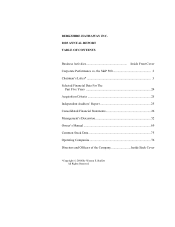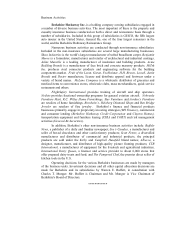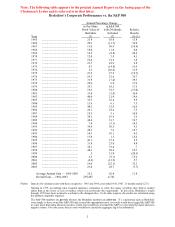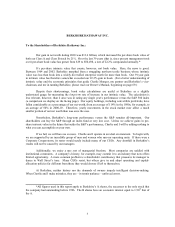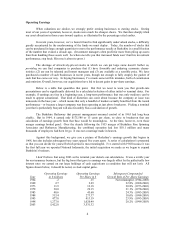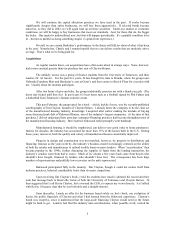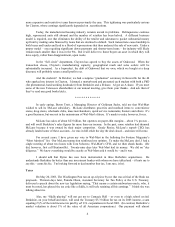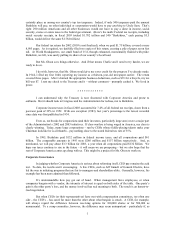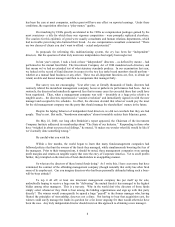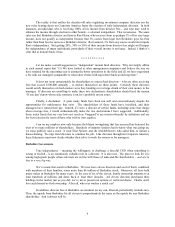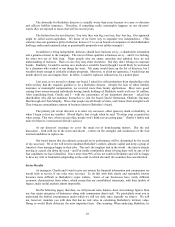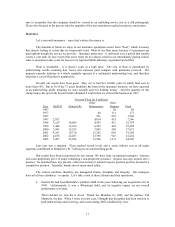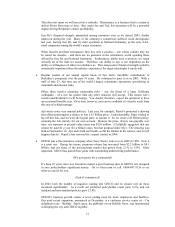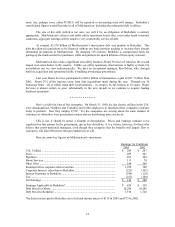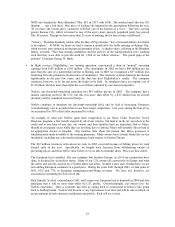Berkshire Hathaway 2003 Annual Report Download - page 10
Download and view the complete annual report
Please find page 10 of the 2003 Berkshire Hathaway annual report below. You can navigate through the pages in the report by either clicking on the pages listed below, or by using the keyword search tool below to find specific information within the annual report.9
The reality is that neither the decades-old rules regulating investment company directors nor the
new rules bearing down on Corporate America foster the election of truly independent directors. In both
instances, an individual who is receiving 100% of his income from director fees – and who may wish to
enhance his income through election to other boards – is deemed independent. That is nonsense. The same
rules say that Berkshire director and lawyer Ron Olson, who receives from us perhaps 3% of his very large
income, does not qualify as independent because that 3% comes from legal fees Berkshire pays his firm
rather than from fees he earns as a Berkshire director. Rest assured, 3% from any source would not torpedo
Ron’ s independence. But getting 20%, 30% or 50% of their income from director fees might well temper
the independence of many individuals, particularly if their overall income is not large. Indeed, I think it’ s
clear that at mutual funds, it has.
* * * * * * * * * * *
Let me make a small suggestion to “independent” mutual fund directors. Why not simply affirm
in each annual report that “(1) We have looked at other management companies and believe the one we
have retained for the upcoming year is among the better operations in the field; and (2) we have negotiated
a fee with our managers comparable to what other clients with equivalent funds would negotiate.”
It does not seem unreasonable for shareholders to expect fund directors – who are often receiving
fees that exceed $100,000 annually – to declare themselves on these points. Certainly these directors
would satisfy themselves on both matters were they handing over a large chunk of their own money to the
manager. If directors are unwilling to make these two declarations, shareholders should heed the maxim
“If you don’ t know whose side someone is on, he’ s probably not on yours.”
Finally, a disclaimer. A great many funds have been run well and conscientiously despite the
opportunities for malfeasance that exist. The shareholders of these funds have benefited, and their
managers have earned their pay. Indeed, if I were a director of certain funds, including some that charge
above-average fees, I would enthusiastically make the two declarations I have suggested. Additionally,
those index funds that are very low-cost (such as Vanguard’ s) are investor-friendly by definition and are
the best selection for most of those who wish to own equities.
I am on my soapbox now only because the blatant wrongdoing that has occurred has betrayed the
trust of so many millions of shareholders. Hundreds of industry insiders had to know what was going on,
yet none publicly said a word. It took Eliot Spitzer, and the whistleblowers who aided him, to initiate a
housecleaning. We urge fund directors to continue the job. Like directors throughout Corporate America,
these fiduciaries must now decide whether their job is to work for owners or for managers.
Berkshire Governance
True independence – meaning the willingness to challenge a forceful CEO when something is
wrong or foolish – is an enormously valuable trait in a director. It is also rare. The place to look for it is
among high-grade people whose interests are in line with those of rank-and-file shareholders – and are in
line in a very big way.
We’ ve made that search at Berkshire. We now have eleven directors and each of them, combined
with members of their families, owns more than $4 million of Berkshire stock. Moreover, all have held
major stakes in Berkshire for many years. In the case of six of the eleven, family ownership amounts to at
least hundreds of millions and dates back at least three decades. All eleven directors purchased their
holdings in the market just as you did; we’ ve never passed out options or restricted shares. Charlie and I
love such honest-to-God ownership. After all, who ever washes a rental car?
In addition, director fees at Berkshire are nominal (as my son, Howard, periodically reminds me).
Thus, the upside from Berkshire for all eleven is proportionately the same as the upside for any Berkshire
shareholder. And it always will be.

